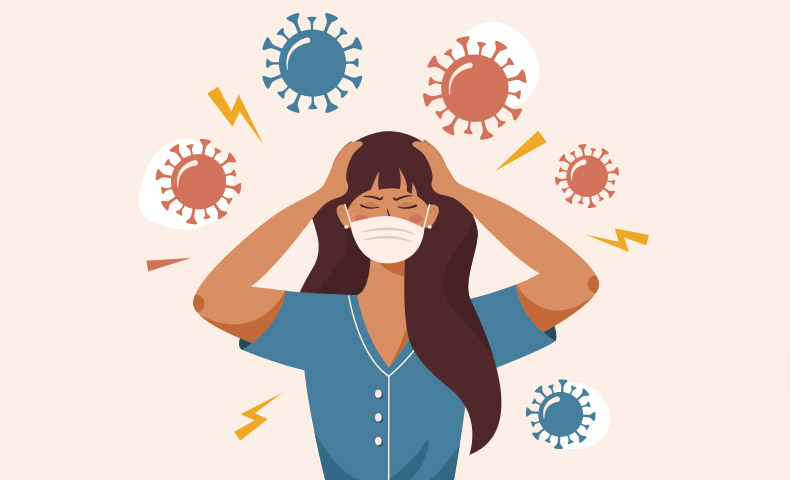
[Image description: An illustration shows a woman wearing a mask and a blue shirt. She has her hands on her hand. There are COVID-19 and allergens circling her.]
Uh-oh. Your nose is running and your throat is scratchy. It’s the time of year you always have seasonal allergies, but COVID-19 is still circulating. How can you tell which is which and what steps should you take?
First, know the symptoms
Seasonal allergies and COVID-19 do have some symptoms in common, including a runny nose and sore throat. Nasal congestion, cough, fatigue, and headache can also be symptoms of either allergies or COVID-19. If you have asthma that’s triggered by allergies, add shortness of breath to the list of symptoms that can be caused by either condition.
However, there are some symptoms that are more common to one or the other. For example, sneezing and itchy or watery eyes tend to be more in line with seasonal allergies. With COVID-19, you’re more likely to have fever, chills, muscle and body aches, nausea, vomiting, diarrhea or a loss of taste or smell.
Keep in mind that everyone’s symptoms — of allergies or COVID-19 — can be different. And it’s possible for you to have symptoms of both at the same time.
If you think it might be COVID-19
If your symptoms suggest you could have COVID-19, talk with a doctor to get care. Doctors on LiveHealth Online can assess your symptoms from the comfort of your home and help with next steps.
While you’re waiting to talk with a doctor, get tested or receive your test results, follow the Centers for Disease Control and Prevention (CDC) guidelines for people with possible COVID-19. Stay at home, rest, drink fluids and separate yourself from other people as much as possible. If you must be near other people (or pets), wear a mask over your nose and mouth.
It’s also a good idea to monitor your symptoms — make note of when they started, whether they seem to be getting better or worse, which treatments you’ve tried and whether they’ve worked.
If you (or someone you’re caring for) has emergency warning signs such as trouble breathing, persistent chest pain or pressure, confusion, or pale or blue/gray skin, lips or nail beds, seek emergency medical care immediately.
If it’s allergies
Wearing a mask, as the CDC recommends to slow the spread of COVID-19, can also help with seasonal allergies. It filters out some of the allergens that can trigger allergy symptoms. If you wear washable masks, be sure to wash them after each use, as they can carry pollen.
Masks aren’t foolproof, though, so be sure to take additional steps to avoid pollen and other allergy triggers when they’re in season. Limit your time outdoors, avoid activities like yardwork that can spread pollen and shower and change clothes when you come in from outside. Consider using an air purifier at home, or talk with a heating, ventilation and air conditioning (HVAC) expert about how to reduce allergens in your home. You can also talk with a doctor, who can help you identify your allergy triggers and recommend over-the-counter or prescription medications to relieve your symptoms. This a good idea if you’re noticing that your allergies are especially bad this year.
Recommended Posts


